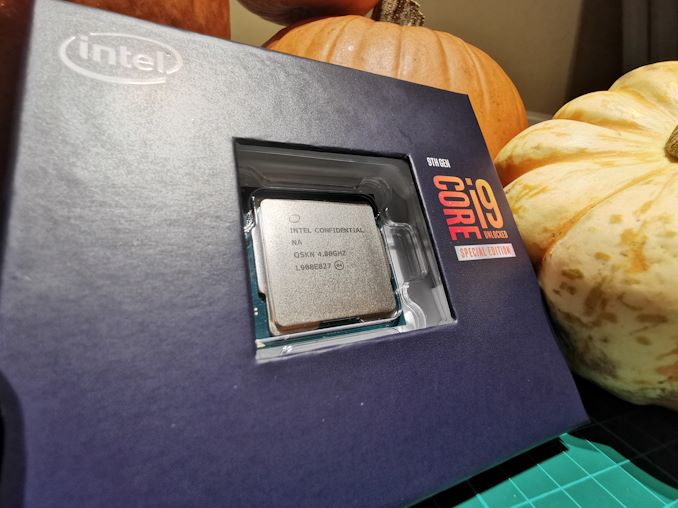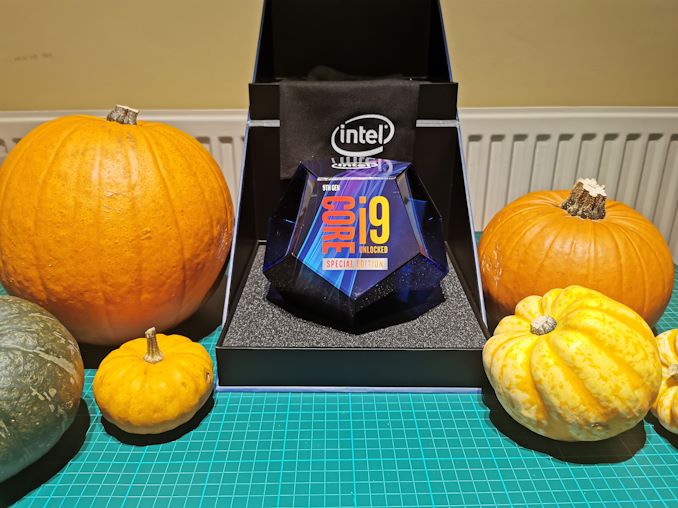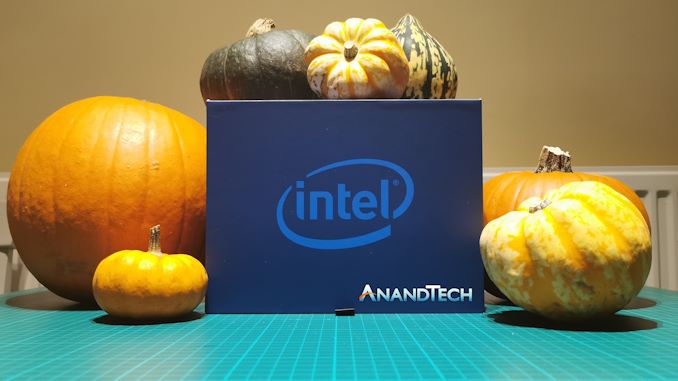The Intel Core i9-9900KS Review: The 5 GHz Consumer Special
by Dr. Ian Cutress on October 31, 2019 10:45 AM ESTConclusion
The Intel Core i9-9900KS is Intel’s first consumer level all-core 5.0 GHz processor. Technically Intel has launched an all 5.0 GHz processor before: earlier this year the Core i9-9990XE was launched into the high-frequency trading market, which had 14 cores at 5.0 GHz, but that part is an auction only part for select business partners. What the Core i9-9900KS does is bring the same principle down to a more consumer friendly core count and a more consumer friendly price point. The tray price is set at $513, although it’s likely to be sold for much more than that.
Playing To Power
One of the key elements I wanted to test in this review is how the chip responds to Turbo. As we’ve discussed at length, and confirmed by Intel: the guidelines for the Turbo settings are not set in stone. Intel actively encourages its motherboard partners to increase these settings if the motherboards are over-engineered to be able to do so. This means that a high-end motherboard should be able to give a longer turbo than a cheap board.
A longer turbo might not mean much. When the turbo budget has run out, the system will limit the chip to the TDP setting in the BIOS (which should be the one on the box), and will try and maximise the frequency for the power limit. On a lot of chips, this means you still have a very high frequency, nowhere near the base frequency. But the power limit does have benefits such as acting as a thermal control at least.
In our test, we used MSI’s Z390 Gaming Edge AC. It’s a mid-upper motherboard, but it set our Core i9-9900KS to have a TDP and turbo power limit of 255W. Intel’s ‘guidelines’ state a TDP of 127 W and a turbo power limit of 159 W. When comparing the two, there are some distinct advantages for the 255W setting, such as 10%+ performance on rendering, but the 159W setting does afford 10C lower temperatures in those heavy workloads. Ultimately, as the name TDP = Thermal Design Power implies, it all comes down on your ability to cool the chip.
For gaming, the turbo budget didn’t seem to matter at all, except in a few tests at super low resolution and settings.
One question that does remain however, is which set of results should we keep? The 255W results are what we get out of the box, and the 159W results are only 'Intel guidelines that Intel expects none of the board manufacturers to keep to'. Ideally we keep both, but that's a mess in its own right.
Planning Against The Competition
There’s no getting around giving Intel kudos for binning enough processors to commercially sell an all-core 5.0 GHz chip. In our benchmarks, we see it steaming ahead of any other consumer grade processor when it comes to single core performance. Users are likely to be able to push that single (or dual) core turbo a bit higher as well, although the power limits should be monitored.
It should be noted that in most cases, the Core i9-9900KS either matched or excelled against the previous king of Intel’s consumer desktop line, the Core i9-9900K. There were a few select instances, namely benchmarks like Handbrake, DigiCortex, F1 2018, and 7-zip, where we did see performance regressions that we weren’t expecting. We’re going to have to go back to Intel to see exactly what these are. But they seem confined to very specific workloads.
Overall, the Core i9-9900KS is Intel’s best ever consumer processor.
In ST performance metrics, it wins. In variable threaded metrics, it either wins or does really well. In MT performance metrics, it depends on how strong AMD’s 12-core hardware really is, and how multithreaded the calculation really is. As Intel slowly adds AVX-512 to its consumer line, as it is with Ice Lake, then the MT competition is going to be really interesting.
Only Available For A Short Time Only
While the Core i9-9990XE is a 14-core 5.0 GHz chip, it is an OEM only part sold by Intel at auction only, whereas the Core i9-9900KS should experience wider availability at retail, albeit for a limited time.
Our colleagues at Tom’s Hardware reported that Intel stated in a promotional video that the processor would only be available during the holiday season of 2019 – or at least that the stock level would not be replenished after the holiday season. When we approached Intel asking for confirmation, we were told:
This special edition processor will be available for a limited time only. It can be found at retailers worldwide. We are not disclosing unit quantity information. However, the Core i9-9900KS will have very limited availability.
There is no doubt that there will be some CPUs available into 2020, however it would appear that Intel is only making one main batch of hardware, and once it has gone, it has gone. This might make the $513 tray price that Intel is putting on the part a bit of a misnomer, as retailers might take advantage of this. This will take the shine off the Core i9-9900KS a little, as at $529 or so it would easily be recommended over a Core i9-9900K. If it goes to $599 or $649 because of its limited release, then it becomes less of an interesting buy.
Ultimately the Core i9-9900KS is going to end up in the hands of enthusiasts who want nothing more than the best, but don’t want to jump to the high-end desktop platform. Despite the Intel chipsets for consumers, it’s still a shame that these processors only have 16 PCIe 3.0 lanes, given the desire for direct attached PCIe storage in this market.













235 Comments
View All Comments
Korguz - Thursday, October 31, 2019 - link
one thing you should consoder.. NO cooling for this cpu at all.. so add at least $90 for that...AshlayW - Friday, November 1, 2019 - link
This too, the Intel CPU doesn't even include a cooler.liquid_c - Sunday, November 3, 2019 - link
AMD does, indeed, include a cooler. But stop acting like a frog and admit that you cannot (properly) use the CPU with that cooler. You'd still have to, eventually, get a AIO or a Noctua. So the fact that you'll have to pay an extra 90$ or so is moot, in this case.Korguz - Sunday, November 3, 2019 - link
moot ?? i dont think so, the cost of this cpu + $90 at least, just to be able to use it, ryzen 3000, no need for a cooler as it is included,if one wants better cooling, then it is an option, not a necessity, for the price, amd wins. for performance, for the most part, amd wins as well, specially in MT. and power usage, amd wins there again, you know, like how people were bashing amd for before zen cam out ?? WHY are people not bashing intel the SAME way now ??amnesia0287 - Friday, November 8, 2019 - link
3950x doesn’t include a cooler.Xyler94 - Thursday, October 31, 2019 - link
The cooling fan on X570 is if you're doing something as crazy as dual PCIe 4.0 NVMe RAID 0. Otherwise, they don't need to spin, as the passive heat dissipation is enough, and Gigabyte makes a board with no fan at all.It's great that Intel works better for you, but the use cases for it comes mostly down to super high refresh rates (240hz displays at 1080p) with medium settings. Otherwise, who cares if you lose maybe 5 frames if you're never gonna see those frames anyways, and if the 12 core Ryzen does almost everything better than the 8 core 9900KS in multi-threaded tasks, then I don't see the drawbacks in buying AMD.
Intel does lead AMD in the core speed and overclocking department however. If you're an enthusiast overclocker, then by all means, disregard AMD
AshlayW - Friday, November 1, 2019 - link
"Better Intel quality control and testing"Substantiated proof please? Otherwise, stop talking out of your backsie, many thanks.
Hey, look I can also be anecdotal: In 10 years of building PCs I've never had a CPU die, Intel or AMD, and only 3 motherboards, two of which was my fault.
Spunjji - Friday, November 1, 2019 - link
My anecdotes:I've had two AMD CPUs die. One was a Duron that I ran with the heatsink improperly mounted, causing it to go pop, and the other was a Barton core Athlon XP that had a corner of the die chip off from having a heavy CPU cooler dismounted and remounted too many times. Both my fault, albeit both consequences of design choices (no thermal regulation on the Duron, no protective heat spreader on the Barton)
I've had 3 Intel CPUs go faulty. All were Sandy Bridge, and every single one appeared to work correctly most of the time but would do weird things like suddenly stutter in games or crash without warning. None of them had been overclocked or otherwise "misused".
Off that basis I'd say AMD do better than Intel. *shrug*
Sivar - Friday, November 1, 2019 - link
AMD's random number generator instruction is crashing Linux and compromising security because it always reports that it can generate a legitimately random number, and it always generates the same one. This has made Sysd in Linux issue a patch that always assumes the generator is bad when it issues that value, a 0xffffffff, which means that when working instruction like Intel's generate that number legitimately, Linux will assume it is defective, too. If they had, say, tested the chip properly, the fact that many distributions of the world's most popular server operating have CPU-related crashes may have been found.AMD made the first chip I have ever used that could not run its stock speed stable, but could run underclocked (AthlonXP).
AMD owns the company formerly known as ATI. Somehow, the quality of their drivers is controversial, but after giving them 6 or 7 chances since the 90's, I will never use that hardware again due to the hilariously low-quality drivers and driver support software. The hardware is often fine, but has at many times been reputed to run too close to the line, requiring intense cooling with leaf blower-like fans, and allowing almost zero overclocking.
Really, the idea that AMD's QA is inferior to Intel's seems strange to even question. AMD, even with their successes here and there (AthlonXP, Athlon 64, Ryzen... and that's pretty much it) has always held a reputation for being the off-brand. Anecdotally, problems with AMD systems have long been considered more likely than with Intel.
I wish AMD the best, and I hope their next-gen Ryzen 4000 series shows a clear win over Intel other than in just core count, but for as excited as I was to get a 3800X or 3900X, when I looked at the numbers and at my own long history as an AMD advocate yet purveyor of fact, I had to conclude that AMD still doesn't quite measure up other than in specific corner cases.
Galid - Friday, November 1, 2019 - link
I owned multiple systems over the past here are some of the cpus: Intel 80286, intel pentium 133, intel pentium II 233 and 350, AMD Athlon 64 3200+, AMD Athlon x2 4200+, Intel Core 2 duo e5400 and q6600, AMD FX-8350, intel i5 2500k and then my brother got a ryzen 3700x that we just built lately. I won't go into all the video cards I've owned/purchased to build systems for my friends/family but here are some of them: ATI rage 128, Nvidia riva tnt2, geforce 2 mx, ATI Radeon 8500, ATI radeon 9700 non-pro, Nvidia 8800 gt, ATI radeon 4850 then upgraded to 4870 1gb and then I pretty much tried everything that came out after that for both team.Sincerely, the biggest problems I've had so far was my geforce 6800 gt's drivers totally incompatible with my Athlon 64 x2 3200+ and that was due to the chipset. Nvidia knew the problem was widespread. We could only fix this by using a very old driver(can't remember which) and sometimes underclock would work. They never fixed this.
My father still uses the FX-8350 and that cpu was not well received back in the days. He has no problems whatsoever.
Again, I'm not a linux user but I've got a friend who swears by linux and he uses AMD hardware. I could ask him why but I do not really care anyway. I remember when I bought my i5 2500k there was a major recall on motherboard including mine for b3 stepping because of the S-ATA controller risk of dying or something like that. 90% of the systems I named above are still running strong and of that 10% dead, it's mostly the motherboards or ram, which aren't built by AMD nor INTEL.
I'm no fanboy, I bought so many systems with always the same objective being the best performance for the dollar depending on the usage of the said system. I just had to comment because when I see someone commenting like that, I think they were simply unlucky and that it has nothing to do with what they beleive.